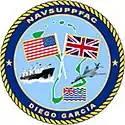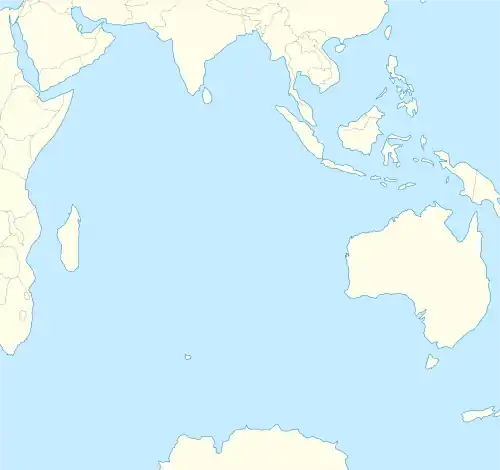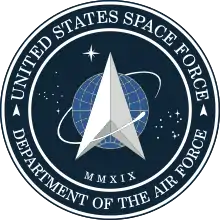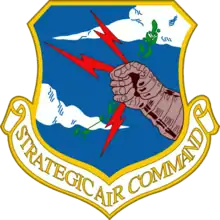Naval Support Facility Diego Garcia
Naval Support Facility Diego Garcia is a British Ministry of Defence facility leased to the United States Navy, located on the atoll Diego Garcia in the Indian Ocean.
| Naval Support Facility Diego Garcia | |||||||
|---|---|---|---|---|---|---|---|
| Diego Garcia in British Indian Ocean Territory | |||||||
 A US Air Force B-1B Lancer taking off from Diego Garcia as part of Operation Enduring Freedom during October 2001. | |||||||
 | |||||||
 NSF Diego Garcia Location in the Indian Ocean | |||||||
| Coordinates | 7°18′48″S 72°24′40″E | ||||||
| Type | Naval Support Facility | ||||||
| Site information | |||||||
| Owner | UK Ministry of Defence | ||||||
| Operator | United States Navy | ||||||
| Controlled by | Commander, Navy Installations Command | ||||||
| Condition | Operational | ||||||
| Website | Naval Support Facility Diego Garcia | ||||||
| Site history | |||||||
| Built | 1971 – 1976 | ||||||
| In use | 1976 – present | ||||||
| Garrison information | |||||||
| Current commander | Captain Blake Tornga | ||||||
| Airfield information | |||||||
| Identifiers | ICAO: FJDG, WMO: 619670 | ||||||
| Elevation | 4.1 metres (13 ft) AMSL | ||||||
| |||||||
Mission
Naval Support Facility Diego Garcia provides Base Operating Services to tenant commands located on the island. The command's mission is "To provide logistic support to operational forces forward deployed to the Indian Ocean and Persian Gulf AORs in support of national policy objectives."[1]
As of January 2012, the facility supported the following tenant commands:
- Maritime Pre-Positioning Ships Squadron TWO
- Branch Health Clinic
- Naval Computer And Telecommunications Station Far East Detachment Diego Garcia
- Naval Mobile Construction Battalion Detachment
- Naval Media Center Detachment Diego Garcia
- Military Sealift Command Office Diego Garcia
- Mission Support Facility
- Fleet Logistics Center Diego Garcia
- NAVFAC Public Works Department
- As of March 2015, the submarine tender USS Emory S. Land (AS-39) is forward deployed to Diego Garcia.
History
The Navy tasked the Seabees of Naval Mobile Construction Battalions 1, 40, 62, 71, 133 and Amphibious Construction Battalion 2 with the construction of the base.[2] On 23 January 1971 the first men of NMCB 40 arrived on site to begin what became an extended project.[2] Naval Support Facility Diego Garcia, was established as the senior United States Navy command on the island on 1 October 1977. At the time the NAVCOMMSTA was the primary tenant, but as new major facilities were completed, most notably the expanded anchorage and mooring area and the extended airfield, other tenants were commissioned.[3] In 1980, the United States Navy established the Near-Term Prepositioned Force of 16 ships. Then NTPF became the Afloat Prepositioning Force (AFP) and eventually Maritime Prepositioning Ship Squadron Two (MPSRON 2) consisting of 20 deep-water pre-positioned logistics ships anchored in the lagoon.[4]
In 1981, the naval air facility was commissioned. It was decommissioned in 1987 and its responsibilities returned to the Naval Support Facility Diego Garcia.[3]
In 1982, construction activities were transferred from the Seabees to a consortium of civilian contractors, Raymond International, and Brown and Root and Molem, a joint venture. Raymond had deep-draft wharf and waterfront skills, Brown and Root had concrete and infrastructure skills, and Molem was an English firm known for taking on challenging projects. The majority of the projects were completed by 1988.[5]
On 26 March 1982, Barbara Shuping and five other women were assigned to the Naval Support Facility Diego Garcia. Prior to this assignment, no women had lived on the island since those on the plantation in 1971.[6]
In 1985; the new port facilities were completed and the USS Saratoga (CV-60) was the first aircraft carrier to tie up.[7]
The Strategic Air Command began deploying Boeing B-52 Stratofortress bombers and aerial refueling aircraft to the newly completed airfield facilities in 1987.[8]
Following the Iraqi invasion of Kuwait in August 1990, three ships of COMPSRON 2 sortied, delivering a Marine Expeditionary Brigade to Saudi Arabia for participation in the Gulf War. Other COMPSRON 2 ships offloaded the ammunition and fuel on Diego Garcia that were required for the American bomber fleet that deployed to the airfield. Subsequently, B-52G bombers flew more than 200 17-hour bombing missions over 44 days and dropped more than 800,000 short tons (730,000,000 kg) of bombs on Iraqi forces in Iraq and Kuwait. One of the B-52s crashed from mechanical failures just north of the island with the loss of three of its six-man crew.[8]
Beginning on 7 October 2001, the United States again commenced military operations from Diego Garcia using B-1, B-2, and B-52 bombers to attack enemy targets in Afghanistan following the attacks on New York City and the Pentagon. On 12 December 2001, a B-1 bomber was lost to mechanical failures just after takeoff from the island, but the crew survived and was rescued by the USS Russell (DDG-59).[9] Four B-2 Shelter System Extra Large Deployable Aircraft Hangar Systems were erected at Diego Garcia to support the bombers' operations.[10][11] Combat operations resumed in the spring of 2003, with MPSRON 2 sortieing to the Persian Gulf for the Iraq War, and bombing operations began again, this time against Iraq.[12] Bomber operations ceased from Diego Garcia on 15 August 2006.[13]
Based units
Flying and notable non-flying units based at Naval Support Facility Diego Garcia.[14][15][16]
Units marked GSU are Geographically Separate Units, which although based at Diego Garcia, are subordinate to a parent unit based at another location.
United States Navy
Fleet and Industrial Supply Center
United States Space ForceSpace Operations Command (SpOC)
|
United States Air ForcePacific Air Forces (PACAF)
Air Mobility Command (AMC)
|
References
- About Navy Support Facility Diego Garcia retrieved 11 November 2011.
- Diego Garcia "Camp Justice" 7º20'S 72º25'E, GlobalSecurity.org web site
- Natural Resources Management Plan (2005), paragraph 2.4.2.
- "COMPSRON TWO Home Page". Msc.navy.mil. Retrieved 2012-06-21.
- Edis (2004), p. 90.
- Edis (2004), p. 91.
- Edis (2004), p. 93.
- Edis (2004), p. 94.
- Edis (2004), p. 96.
- "B-2 Shelter System [B2SS] Extra Large Deployable Aircraft Hangar Systems (Formerly: B-2 Shelter Program)". GlobalSecurity.org. Archived from the original on April 14, 2013. Retrieved June 24, 2018.
As of early January 2005, four completed shelters were visible on one of the parking ramps of Diego Garcia.
- Specht, Wayne (January 16, 2003). "Portable B-2 bomber shelters are built ... in parts (officially) unknown". Stars and Stripes.
- Edis (2004), p. 97.
- "Important Dates of the Provisional People's Democratic Republic of Diego Garcia". August 29, 2011. Retrieved September 27, 2011.
- "Tenant Commands". Naval Support Facility Diego Garcia. US Navy. Retrieved 8 April 2020.
- "20th Space Control Squadron". Peterson Air Force Base. US Air Force. 6 August 2018. Retrieved 8 April 2020.
- "21st Space Operations Squadron". Schriever Air Force Base. US Air Force. December 2019. Retrieved 8 April 2020.
- Edis, Richard (2004). Peak of Limuria: the Story of Diego Garcia and the Chagos Archipelago. Chippenham, UK: Antony Rowe Ltd.
- Ladwig III; Walter C.; Andrew S. Erickson & Justin D. Mikolay (2014). Diego Garcia and American Security in the Indian Ocean, (PDF). in Carnes Lord and Andrew Erickson Rebalancing US Forces: Basing and Forward Presence in the Asia Pacific. Annapolis, MD: Naval Institute Press. Archived from the original (PDF) on 2015-09-03.
Further reading
- Ladwig III, Walter C., Andrew S. Erickson, and Justin D. Mikolay,"Diego Garcia and American Security in the Indian Ocean," in Carnes Lord and Andrew Erickson Rebalancing US Forces: Basing and Forward Presence in the Asia Pacific Annapolis, MD: Naval Institute Press, 2014, pp. 131–180.
- Ladwig III, Walter C., "A Neo-Nixon Doctrine for the Indian Ocean: Helping States Help Themselves" (PDF). Strategic Analysis. May 2012.
- Urish, Daniel W., Coral, Copra, and Concrete: An Illustrated Memoir of Diego Garcia Atoll (2015).
- US Naval Support Facility Diego Garcia "Integrated Natural Resources Management Plan," September 2005.
External links
| Wikimedia Commons has media related to Naval Support Facility Diego Garcia. |

